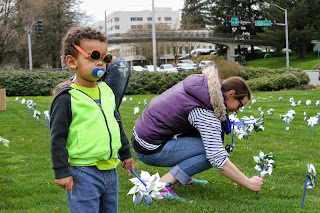One of the meeting’s highlights was a discussion on the early
learning facilities grant program. The program, administered by the
Department of Commerce, will provide nearly $15 million in grants and loans for
early learning facilities. These grants will reimburse child care providers for
up to 75 percent of the total cost of capital projects. Grants can range from
$10,000 to $800,000. Eligible providers include those who serve or intend to
serve children through the Early Childhood Education and Assistance Program (ECEAP)
or Working Connections Child Care.
The meeting also touched on aspects of the DCYF transition.
Members received an update on the new department’s outcome goals and measures,
which will serve as the basis for the work of the new department. The goals
will focus on the education, health and resilience of children, youth and
families in Washington state. ELAC members encouraged the Office of Innovation,
Alignment and Accountability to focus on prevention and strength-based resilience measures as they move forward.
Council members also began the task of streamlining the
stakeholder advisory process. Both DEL and Children’s Administration, which is
also joining DCYF on July 1, meet regularly with groups of stakeholders such as
ELAC to get recommendations on policies and programs. Under DCYF, stakeholder
groups will be combined, eliminated and added as necessary to establish a more
effective advisory system.
“July 1 is just the start date,” said DEL Assistant Director
Frank Ordway. “It’s really the beginning of the next chapter of work.”
Also on the agenda were updates on the Child Care and Development
Fund (CCDF) and the standards alignment process. ELAC members wished a fond
farewell to departing member Peter Finch, assistant superintendent at the West
Valley School District, who has been an active member on the council for two
years.
“I really appreciate the lens you bring, Peter, to this
table. Your passion and your energy are very evident when you talk about
young children in early learning,” said ELAC Regional Advisor Enrica Hampton.
“We’re going to miss you tremendously.”
Although he is leaving the group, Finch said he hopes to
attend future meetings as a member of the public.
The next ELAC meeting will be held August 14 in Spokane. For
updates on ELAC’s activities, visit https://del.wa.gov/partnerships/elac/meetings.















